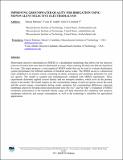Improving groundwater quality for irrigation using monovalent selective electrodialysis
Author(s)
Rehman, Danyal; Ahdab, Yvana D; Lienhard, John H
DownloadIDAWC2019_Rehman.pdf (1.271Mb)
Open Access Policy
Open Access Policy
Creative Commons Attribution-Noncommercial-Share Alike
Metadata
Show full item recordAbstract
Monovalent selective electrodialysis (MSED) is a desalination technology that allows for the selective
removal of monovalent ions that are detrimental to crops, while retaining divalent ions that are beneficial
for crops. This paper proposes a semi-empirical MSED model that can be used to evaluate desalination
system performance for different salinities of brackish source water. The MSED set-up is a discretized
stack modelled as an electric circuit, consisting of ohmic resistances and membrane potentials for each
ion species. The model is coupled and simultaneously validated with MSED experiments. These
experiments determine applied current density and ion transport numbers, which serve as the primary
inputs to the model. The model outputs are the concentration change of each ion species across the stack
and the system energy consumption during steady operation. Ion concentration differences represent
membrane selectivity towards monovalent/divalent ions (Na+/Ca2+ and Na+/Mg2+). Evaluation of MSED
membrane performance in the brackish salinity range will help determine the conditions that optimize
membrane selectivity and energy consumption, as well as the technology’s suitability for agricultural
applications.
Date issued
2019-10Department
Massachusetts Institute of Technology. Department of Mechanical EngineeringJournal
IDA World Congress on Desalination and Water Reuse
Publisher
International Desalination Association
Citation
D. Rehman et al. “Improving groundwater quality for irrigation using monovalent selective electrodialysis,” IDA World Congress on Desalination and Water Reuse, October 2019, Dubai, India, International Desalination Association, October 2019
Version: Author's final manuscript